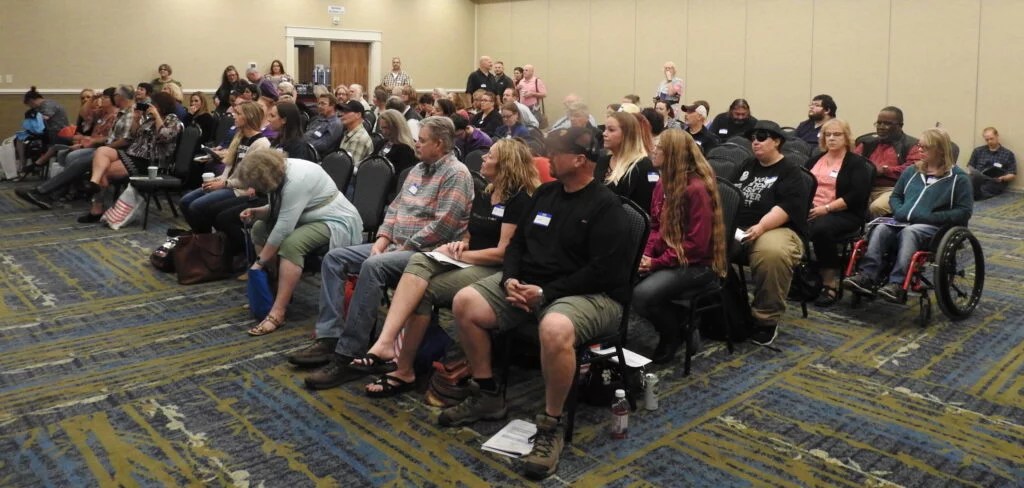We are a network of individuals who are on the path of recovery.
We identify as being in recovery from mental health, substance abuse and or addiction struggles. Together we share information, provide peer support, advocate with a united voice and improve the system. We come from places all across Montana, with different stories and experiences but together we make a difference. This is the Recovery Movement in Montana.


Realizing Recovery Blog
The Inner Child and My Mental Health Disorder
What people see on the outside is just a hint of what is happening within. Moving through life and feeling the world while my trauma weaves stories about my emotions creates a mental storm legitimized by science as a mental health disorder. Some people call this empathic or highly sensitive, being tuned into what my immediate circle feels and carrying the unspoken weight of our disease. Mental health goes back as far as I could research in my family; it is the generational pattern that has been transferred from mother to child; it manifests as the burning of the internal turmoil in the middle of my life and replaces the peace my heart came here to feel.
Mental Health Awareness Month
May is Mental Health Awareness Month, and as someone who is in recovery from substance use disorder and mental health issues, I am grateful for this opportunity to share my story and help raise awareness about mental health. I live in Billings, Montana, and even here I’ve found that it can be challenging for people in our community to find the resources and support they need to manage these conditions. That’s why I feel it’s essential to talk openly about mental health to help reduce stigma and encourage people to seek help when they need it.
A Journey to Wellness
I recently learned about the 8 Dimensions of Wellness. Before I dive into these, I first want to define what “wellness” means. Wellness is the “act of practicing healthy habits on a daily basis to attain better physical and mental health outcomes.1” For many people, wellness is associated with physical health, but not necessarily with mental health. I know that was true for me for much of my life. By taking stock of different areas of my life and consciously making a plan for how to improve these various aspects, I can increase my quality of life. I am just starting this journey myself and have a ways to go, but I believe with guidance from these dimensions, I can make some improvements in myself.
The Importance of Mental Health Awareness
When I started getting diagnosed with mental health conditions, I was still a teenager. I was ashamed, scared, and felt like I was doomed. I come from a family that has both mental health conditions and substance abuse disorders, so I was aware of what they both can look like. It hit me hard, and even though I had seen struggles within my family’s dynamics, I still held shame and guilt from my situation. I later learned that the shame and guilt was not mine to carry, but before that, I carried it like I was packing luggage around, everywhere I went.
May is Mental Health Awareness Month!
Check out stickers and other resources for Mental Health Awareness Month and Children’s Mental Health Acceptance Week!
Mental Health Awareness Month 2023
I have, over the past couple of years, been homing in on specific dimension of wellness and working on the dimension for an entire year. Each of these dimensions plays a key role in my overall mental health.
Forgiveness is Freedom
If I could give another word for recovery, it would be forgiveness because if resentment is the blind spot of addiction, then forgiveness is a corrected vision. Forgiveness is an inner connection versus an emphasis on the crisis. In other words, resentment is fear, and forgiveness is love.
Practices, Principles, and Purpose of Forgiveness
Forgiveness is a big part of a healing journey. It takes a lot of acceptance to be able to forgive and to acknowledge there is a need to understand that whatever it is that is holding one back, or is causing inner conflicts, is not always ours to own. We do not have to completely understand the reasoning behind one’s negative doing to us, we don’t ever have to forget, but being able to forgive, can allow healing and growth to continue.
My Journey to Forgiveness
What is the true meaning of forgiveness? Psychologists generally define forgiveness as a conscious, deliberate decision to release feelings of resentment or vengeance toward a person or group who has harmed you, regardless of whether they actually deserve your forgiveness.
Forgiveness
What an amazing subject to talk about. This will be my first time getting share with you on the topic of forgiveness. I would like to start off with saying if recovery is possible, so is forgiveness. I believe that it is hard to have one without the other. As I was growing up I had examples of forgiveness in my life.
Advocacy
Check out our new page dedicated to tracking state and federal bills, executive orders, and lawsuits.
 Standing up for what we believe is right, having a voice, making choices in recovery, and sharing our own recovery story are some of the things that make up advocacy and self-advocacy.
Standing up for what we believe is right, having a voice, making choices in recovery, and sharing our own recovery story are some of the things that make up advocacy and self-advocacy.
Let’s start with self-advocacy which refers to an individual’s ability to effectively communicate, convey, negotiate, or assert his/her own interests, desires, needs, or rights. It involves making informed decisions and taking responsibility for those decisions (Van Reusen et al., 1994).
Knowing yourself and your strengths, needs, and interests is the first step toward advocating for your rights. Once we begin to find our way on the path of recovery, we may want to begin to advocate for ourselves with those around us—peer supporters, friends, family, service providers, and doctors. These conversations may be difficult, but having them is vital to your recovery. Remember, you are the expert on yourself.
It may be that prior to getting on the path to recovery, others were making decisions for you or acting in what they believed to be your best interest. Now may be the time for you to let others know what you believe to be in your best interest. You may find yourself in the process of taking control and making decisions affecting your life and perhaps others’ lives. This process of self-determination means making informed choices, problem solving, setting and attaining goals—essentially being a self-advocate.
Advocacy or advocating for others may be something you are interested in doing. Advocating for another person isn’t about acting in a person’s perceived best interest, but it is standing with a person to ensure they are able to articulate and obtain what they want or need. Perhaps you may consider speaking up and advocating for various changes in the services in your community.
Here are a few examples of advocacy:
- Speak to your legislature or a special committee.
- Get involved with an advocacy group or organization.
- Share your recovery story to support others in recovery.
- Whether advocating for yourself, for others, for your community, or as part of an organization, advocacy is very self-empowering. You can make a real difference in your life, the lives of others, and even the community.
- Reach out to Montana’s Peer Network and share your recovery story on one of our “Recovery Talks” podcasts.
Advancing Advocacy Blog
Native American Heritage Month
The arrival of Native American Heritage Month heralds a deeply personal journey for me, a Blackfoot woman steadfastly navigating the intricate path of recovery. Within the expansive tapestry of indigenous cultures, I discover not only solace and strength but a profound connection to my roots that serves as the cornerstone of my journey of self-discovery. Engaged in tribal liaison work with Montana tribes, this month transcends mere celebration; it stands as a testament to the transformative power of cultural heritage, weaving through my role as a mother and illuminating the unique lens of recovery from an American Indian woman’s perspective.
Elevating PSS through Career Development: A Pathway to Success
Peer Support Specialists play a crucial role in the behavioral health field, offering empathetic understanding and lived experience to those in need. While their dedication is commendable, it’s essential to recognize the immense value that career development can bring to their professional journey. Montana’s Peer Network continues to create opportunities for career development because we recognize the significance of investing in the growth and advancement of Peer Support Specialists, and how it not only benefits them personally but also contributes to the overall improvement of behavioral health services.



